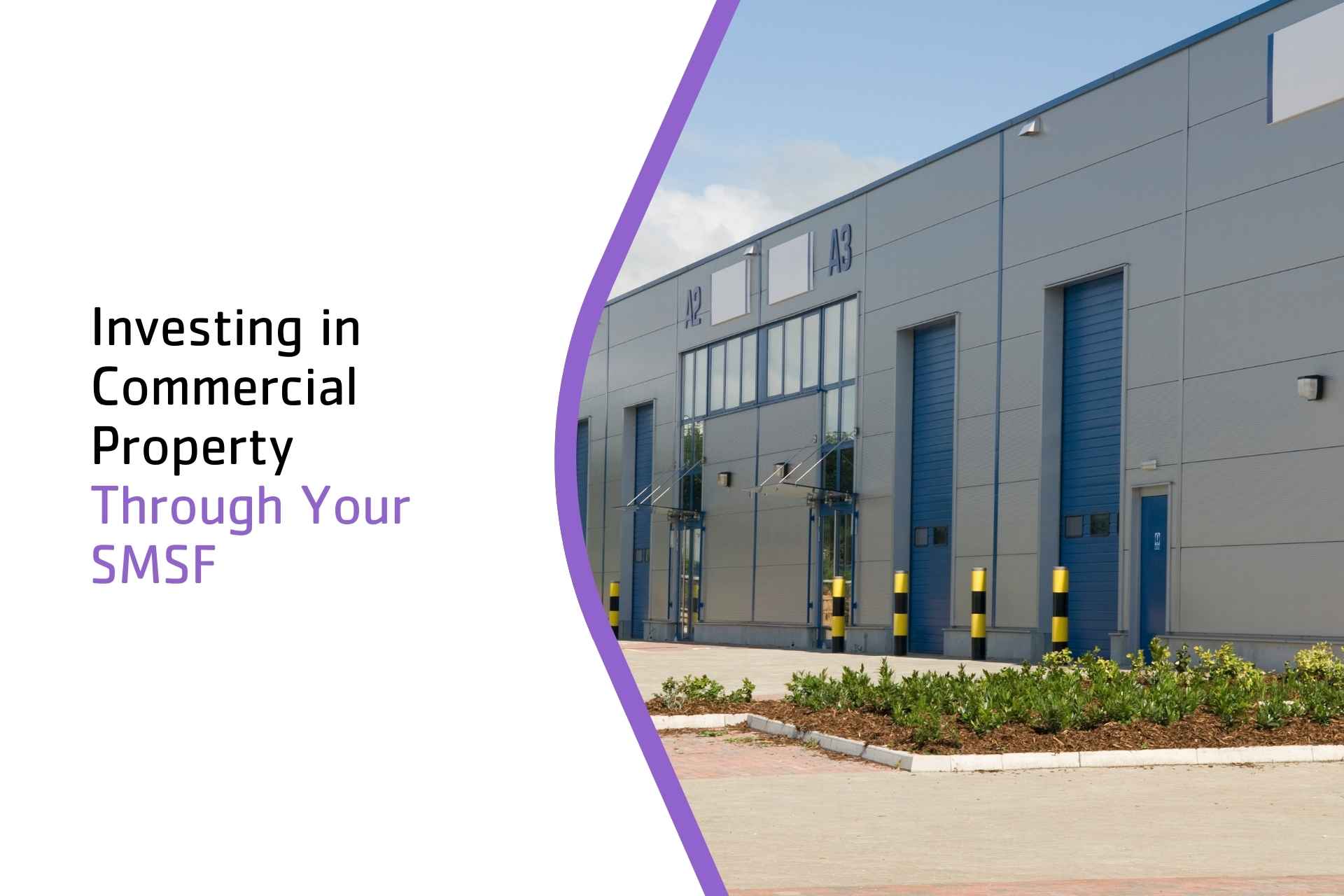Investing in commercial property through a Self-Managed Super Fund (SMSF) can be a powerful strategy for growing your retirement savings. However, it comes with a set of responsibilities and considerations. Before proceeding, it’s crucial to speak to a financial advisor to understand the implications fully.
Table of Contents
- Advantages of Buying Commercial Property Through Your SMSF
- Disadvantages of Buying Commercial Property Through Your SMSF
- Who Should Consider Buying Commercial Property Through Their SMSF?
- How Buying Commercial Property Through Your SMSF Works
- Responsibilities When Purchasing a Commercial Property in an SMSF
- Organising Lending and What You Need
- Is Commercial Property the Right Strategy for Your Super?
- Work With a Financial Planner
- Webinar – Building Wealth: SMSFs and Commercial Property Investments
Advantages of Buying Commercial Property Through Your SMSF
One of the big advantages of setting up a Self-Managed Super Fund (SMSF) is the ability to make investments that suit your personal or business financial strategy. For some, this includes property. If you’re considering purchasing commercial property through your SMSF, it’s crucial to understand exactly what’s involved.
Here are some key advantages:
- Tax Efficiency: Benefit from the 15% superannuation income tax rate, making it a tax-effective option.
- Self-Rental Income: Grow your SMSF quicker by paying rent to yourself instead of a landlord.
- Asset Payoff Strategy: Hold your business premises in your SMSF and rent it out to your business. This allows you to effectively pay off your assets while keeping the funds within your SMSF.
- Asset Protection: Increased asset protection, as your business is a separate entity from your SMSF.
- Secure Tenancy: Your SMSF holds the property, ensuring secure tenancy for your business.
Disadvantages of Buying Commercial Property Through Your SMSF
- Limited Access to Funds: Hard to quickly convert property into cash.
- High Upfront Costs: Significant initial expenses including deposit, stamp duty and legal fees.
- Strict Regulatory Compliance: Must adhere to strict SMSF regulations to avoid penalties.
- Complex Borrowing Arrangements: Setting up and managing a Limited Recourse Borrowing Arrangement adds complexity.
- Reduced Diversification: Large investment in one property increases risk.
- Vacancy and Tenant Risk: Loss of rental income during vacancies or tenant defaults impacts cash flow and SMSF performance.
Who Should Consider Buying Commercial Property Through Their SMSF?
Business Owners
SMSFs are particularly beneficial for business owners. The flexibility of this structure allows you to purchase your business property through your SMSF. This means that your SMSF uses your rent payments to pay off the loan, with the rent going directly to your SMSF as income.
Medical Professionals
Buying medical premises is a popular strategy for doctors and dentists. In practices where multiple medical professionals work together, each professional likely has a substantial amount in their super, providing the flexibility to diversify super assets into commercial property.
How Buying Commercial Property Through Your SMSF Works
- Assess Your Balance: Ensure you have the correct balance for a commercial property purchase. If buying outright, you’ll need the full cash amount in your SMSF plus stamp duty (approximately 5%).
- Organise Financing: If borrowing, expect to need a deposit of 30%-40% plus stamp duty. Additional cash will be required for legal expenses and ongoing costs like rates, strata fees and insurance.
- Limited Recourse Borrowing Arrangement (LRBA): This arrangement protects your SMSF assets from the lender if the property loan fails. Set up a bare trust within your SMSF to isolate the commercial property investment from other investments.
- Select and Purchase Property: Choose a property within your financial capacity. Ensure the purchase contract is signed in the name of your SMSF.
- Set Up Lease Arrangements: Establish a commercial lease at market rates, even if leasing to your own business. Document this with a lease agreement.
- Compliance and Management: Ensure ongoing compliance with annual rent payments and SMSF regulations, maintaining proper documentation and management.
Responsibilities When Purchasing a Commercial Property in an SMSF
Compliance with Superannuation Laws
Ensure the purchase complies with the Sole Purpose Test, which means the investment should solely provide retirement benefits to fund members. Follow the investment strategy guidelines outlined in your SMSF’s trust deed and maintain proper documentation and record-keeping to satisfy legal and audit requirements set by the ATO.
Property Management
Take responsibility for property upkeep, tenant management and dealing with any disputes. Ensure the property remains a sound investment that aligns with the fund’s long-term strategy.
Regular Valuations
Conduct regular property valuations to ensure compliance with SMSF regulations and to accurately report the fund’s assets.
Organising Lending and What You Need
Lending Criteria
Lenders typically finance up to 70% of the property’s value. Demonstrate that the SMSF can service the loan from the fund’s cash flow.
Required Documentation
Ensure your SMSF Trust Deed allows borrowing and investment in commercial property. Document how the property investment aligns with the fund’s strategy and provide recent financial statements of the SMSF to the lender.
Borrowing Structure
Set up a Bare Trust (or Custodian Trust) where the property title is held on behalf of the SMSF until the loan is repaid.
Is Commercial Property the Right Strategy for Your Super?
Investing in commercial property can diversify your SMSF portfolio and provide a stable income stream. However, consider the following:
- Primary Purpose of Superannuation: The main goal is to grow assets that can provide an income in retirement. Evaluate if a commercial property truly supports this objective.
- Complex Financing: Securing finance for commercial property is more complex than residential. Work with lenders who understand SMSFs and offer competitive rates.
- Long-term Implications: Assess the long-term implications and liquidity needs of your SMSF. Commercial properties can offer strong returns but also come with risks such as longer vacancy periods.
When acting as an SMSF trustee, think with a trustee mindset, ensuring all decisions align with the goal of providing for your retirement.
Work With a Financial Planner
Investing in commercial property through an SMSF can offer substantial benefits, including potential tax advantages and a steady income stream. However, it requires careful planning, compliance and a clear strategy. Consulting with professionals such as accountants, brokers and financial planners is essential to navigate this complex process and ensure it aligns with your overall retirement strategy.
If you’re considering this investment route, speak to our team at Carbon Group. We offer expert guidance in accounting, finance and wealth management to help you make informed decisions and maximise your SMSF’s potential.






















